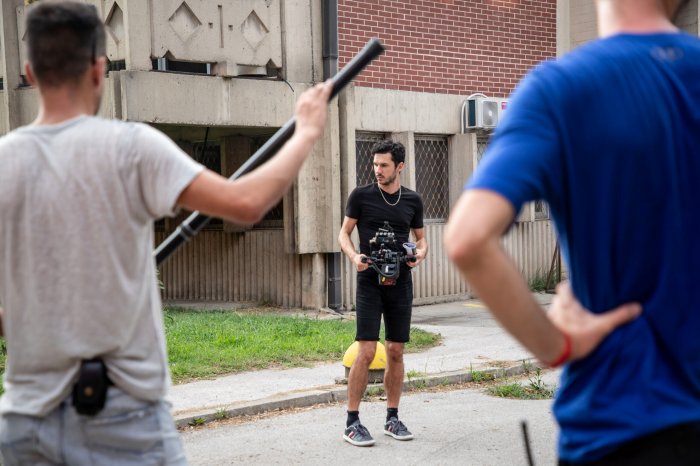Yoon Jun-sang and Isabelle Huppert in Hong Sang-soo’s “In Another Country.” | KINO LORBER
South Korean director Hong Sang-soo’s “In Another Country” is the third of his films to open in New York this year. To some, that might suggest huge commercial success on his part. On the contrary, no Hong film has played more than two weeks in a theatrical run here. The immediate predecessors of “In Another Country,” “Oki’s Movie” and “The Day He Arrives,” both closed in a week. If you’re planning to see “In Another Country,” don’t wait.
Hong has benefited from the attention given to Korean cinema as a whole. Averaging a film a year, he’s slowly built a large body of work. Korean films like Kim Ki-duk’s “Spring, Summer, Fall, Winter… and Spring” and Bong Joon-ho’s “The Host” were big arthouse hits, while Korean directors like Park Chan-wook and Kim Jee-woon are about to make their Hollywood debuts. Kim Ki-duk’s “Pieta” recently won the top prize at the Venice Film Festival, although it must be noted that many critics thought it was awful –– Cinema Scope magazine mocked the film by running 13 snarky negative reviews on its website.
The vogue for Korean films has created a climate where even a film as uncommercial as the documentary “Planet of Snail,” about a deaf and blind poet, could get a brief New York run.
At the start of “In Another Country,” a young female film student and her mother head to the seaside town of Mohang to escape the pressures of debt. The student starts working on three scripts for short films. Each of the shorts is dramatized by Hong, lasting about half an hour. They all roughly share the same cast of characters, most notably a French woman named Anne (Isabelle Huppert).
Anne changes identity and profession from film to film. In the first one, she’s a filmmaker who seems modeled on Claire Denis. The second Anne is having a secret affair with a Korean man, and the third one is a divorced woman whose husband abandoned her for a Korean woman. Anne always stays at the same hotel and meets a lifeguard on a rather desolate stretch of beach.
The odd thing about Hong’s lack of commercial success in the US is that his films aren’t arcane or inaccessible. Hell, they’ve frequently been compared to Woody Allen’s work! The director has created his own universe. Some of his early defenders jumped off the bandwagon when it became apparent that Hong was repeating himself to a great extent. On the other hand, if one accepts that his films repeat certain structures and themes, they can become all the more fascinating.
On a narrative level, they almost always involve filmmaking, binge drinking, and male misbehavior. Hong once made a film called “Woman Is the Future of Man,” prompting one woman at the New York Film Festival’s Q&A session to comment, “If woman is the future of man, men are screwed.” That said, he does seem to be making an effort to represent a female point of view in his past few films.
Hong’s films started out with a doubled structure. Some observers suggested this was an oblique reference to the divided nature of the Korean peninsula. However, he has grown past that into even more complex structures. “In Another Country” is never difficult to follow, but it relies on repetition of certain key images. In her various incarnations, Anne asks the lifeguard for directions to a lighthouse. She sees him swimming in chilly water. “In Another Country” comes to resemble a piece of music, with Hong improvising a solo over a basic set of chords and melody.
In terms of visual style, Hong’s recent films have been marked by the use of the zoom lens. His utilization of this device to direct the spectator’s attention is sometimes shockingly blunt. He uses it with an obsessive concentration that most directors abandoned after the early ‘70s, when it was briefly fashionable and best deployed by Roberto Rossellini (in his made-for-TV films) and Robert Altman.
Much of “In Another Country” takes place in exteriors, and Hong’s direction seems torn between the desire to repeat images and narrative motifs and a spontaneous openness to the pleasures of a bright summer day –– even if the lifeguard does keep complaining about the water temperature.
“In Another Country” is a delightful comedy that shows Huppert’s ability to play characters who aren’t obsessive neurotics or dangerously sexually frustrated, as in films like Denis’ “White Material” or Michael Haneke’s “The Piano Teacher.
In the context of Hong’s oeuvre, the film may suffer in some eyes from its very straightforward and lighthearted tone, but these qualities might also make it his American breakthrough. It’s about time Hong found an audience beyond the international festival circuit, where he’s long been welcome. Korean cinema isn’t going to stay hip forever, but one senses Hong will keep plugging away until old age.
IN ANOTHER COUNTRY | Directed by Hong Sang-soo | In English and Korean with English subtitles | Kino Lorber | Opens Nov. 9 | Lincoln Plaza | 1886 Broadway at 63rd St. | lincolnplazacinema.com



































